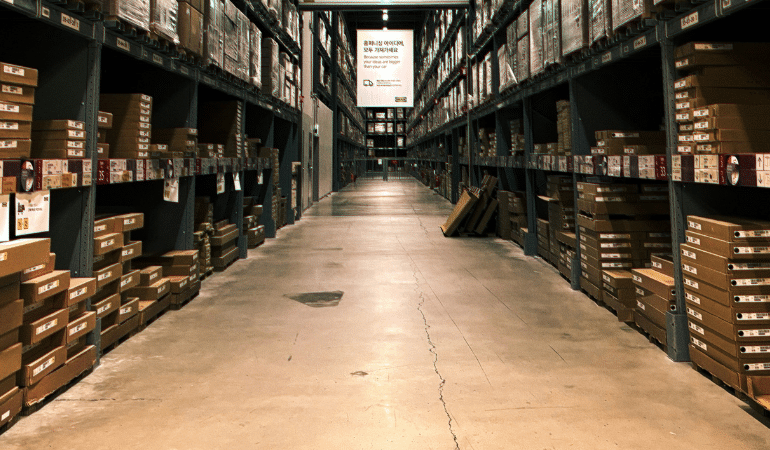Modern retailers, wholesalers, and e-commerce businesses know that optimizing your supply chain is key to success. For those involved in international trade, one way to boost efficiency and cost-effectiveness is by using a bonded warehouse. In a nutshell, this type of warehouse allows you to store goods imported from overseas without needing to pay duties or taxes until they’re released into the local market.
This blog post will unpack the concept of bonded warehousing and help you decide if it could be a valuable solution for your specific needs. We’ll examine how it can potentially reduce costs, improve cash flow, and give you more flexibility when managing inventory.
What Is a Bonded Warehouse?
A bonded warehouse is a secure storage facility where goods can be stored without paying import customs duties or taxes until they are released for sale or distribution. These warehouses operate under the supervision of customs authorities, ensuring the integrity and security of the stored goods.
It’s important to note that there are different types of customs-bonded warehouses. Some are owned and operated by the government, while others are privately managed. This variety allows businesses to choose a warehouse that best suits their specific needs and requirements.
Key Features of a Bonded Warehouse
- Duty and Tax Deferment: Importers can defer paying duties and taxes until the goods are removed from the warehouse, improving cash flow and reducing upfront costs.
- Secure Storage: Bonded warehouses provide a secure environment under customs supervision, minimizing the risk of theft, damage, or loss.
- Flexibility: Goods stored in a bonded warehouse can remain there until they are sold, re-exported, or undergo value-added processing.
- Ideal for Various Businesses: Bonded warehouses are commonly used by wholesalers, e-commerce retailers, importers, and exporters dealing with international trade.
When is a Bonded Warehouse Necessary?
Bonded warehouses offer a unique set of advantages for businesses involved in international trade. But how can you determine if utilizing one is the right decision for your business? Here’s a breakdown of situations where a bonded warehouse becomes a valuable asset:
a. Managing High-Volume Imports and Costs
Importing large quantities of goods can be expensive, especially when factoring in applicable duties and taxes. Bonded warehouses allow you to defer these payments, giving you greater control over your cash flow and reducing the financial burden of importing in bulk. This is particularly beneficial when dealing with high-value items or fluctuating demand.
b. Streamlining International Fulfillment
Many bonded warehouses offer in-house fulfillment services, making them an attractive option for businesses engaged in international e-commerce. By storing goods in a bonded warehouse in a foreign country, you can fulfill orders locally, reducing shipping costs and transit times while deferring import duties until the point of sale.
c. Long-Term Storage Needs
If you require long-term storage solutions for your goods, bonded warehouses can accommodate your needs. In the U.S., you can store items for up to five years without paying duties, providing flexibility and minimizing the need for frequent relocation.
d. Handling Restricted Goods
Importing restricted items like alcohol, tobacco, or certain food products often involves complex regulations and strict deadlines for obtaining permits. Bonded warehouses are exempt from these typical storage time limits, providing valuable breathing room to navigate the import process and ensure compliance.
e. Navigating Economic and Political Uncertainty
Bonded warehouses can act as a buffer against economic and political risks. If tariffs are high or policies are volatile, storing goods in a bonded warehouse allows you to wait for more favorable conditions before releasing them into the market.
f. Optimizing Pre-Market Preparation
Some bonded warehouses offer facilities for processing and prepping goods before they enter the market. This allows you to perform value-added activities like labeling, packaging, or quality control without incurring duties on items that may be discarded or re-exported.
When Might a Bonded Warehouse Not Be the Best Fit?
While bonded warehouses offer numerous advantages, they might not be the ideal solution for every business. Here are some scenarios where a bonded warehouse might not be the most suitable option:
a. Low-Value or Low-Duty Goods
If you’re importing goods with low value or minimal import duties, the costs associated with bonded warehousing might outweigh the benefits of duty deferral. In such cases, it might be more cost-effective to pay the duties upfront and store the goods in a regular warehouse.
b. Fast Turnover or Just-in-Time Supply Chains
For businesses with fast inventory turnover rates or those operating just-in-time supply chains, the additional handling and processing required to maintain customs control within a bonded warehouse could introduce unnecessary delays. In these situations, speed and efficiency are paramount, and a direct-to-market approach might be more suitable.
c. Limited International Trade
If your business only engages in occasional or infrequent imports or exports, the need for a bonded warehouse might not be justified. The costs associated with maintaining a bonded facility might outweigh the benefits for businesses with limited international trade activity.
How to Decide What’s Right for Your Business
Choosing the best warehousing strategy for your business involves a careful evaluation of your specific needs and priorities. Here’s a framework to guide your decision:
1. Analyze Your Import Profile:
- Product Value & Duty Rates: Calculate the potential duty savings offered by bonded warehousing. Consider the value of your goods and the associated import duties. Higher-value, high-duty items often make bonded warehouses more attractive.
- Import Frequency & Volume: Assess how often you import and the typical volume of your shipments. Frequent, high-volume imports may benefit from the streamlined customs processes and duty deferral of bonded warehousing.
- Product Type & Regulations: Determine if your goods have any special storage requirements or are subject to specific import regulations. Bonded warehouses can be advantageous for handling restricted goods or those requiring specialized handling.
2. Evaluate Your Operational Needs:
- Inventory Turnover: Analyze your inventory turnover rate. If you have a high turnover and require quick order fulfillment, alternatives like just-in-time inventory management or direct-to-consumer fulfillment might be more suitable.
- Storage Duration: Determine your typical storage needs. If you require long-term storage for aging or seasonal products, bonded warehouses offer extended storage options with duty deferral.
- Flexibility & Scalability: Consider whether your business needs fluctuate. If you have seasonal demand or unpredictable sales volumes, flexible warehousing solutions may be more adaptable than a fixed-term bonded warehouse contract.
3. Assess Financial Implications:
- Leasing & Operational Costs: Factor in the costs of leasing bonded warehouse space, which vary based on size, location, and services. Consider ongoing expenses like handling fees and storage fees.
- Duty Deferral vs. Upfront Payments: Weigh the financial benefits of deferring duty payments against the ongoing costs of bonded warehousing. Analyze how duty deferral could impact your cash flow and working capital compared to paying duties upfront.
By systematically analyzing these factors, you can gain a clear understanding of whether a bonded warehouse aligns with your business objectives or if alternative solutions would be a better fit.
What Are the Alternatives to Bonded Warehouses?
If you’ve determined that a bonded warehouse isn’t the right fit for your business, there are several other options to consider for your storage and logistics needs:
Standard Warehousing Solutions
Third-party logistics (3PL) providers offer a wide range of warehousing and distribution services without the customs oversight associated with bonded warehouses. These non-bonded warehouse solutions are particularly useful for businesses operating primarily within domestic markets and who don’t require duty deferral or specialized customs procedures.
Free Trade Zones (FTZs)
In certain regions, Free Trade Zones offer duty-free storage and manufacturing benefits, often with less stringent regulations compared to bonded warehouses. FTZs can be a suitable alternative for companies involved in international trade seeking greater flexibility in their operations.
On-Demand or Flexible Warehousing
For businesses with fluctuating inventory levels or seasonal demand, on-demand or flexible warehousing solutions provide scalable storage options without long-term commitments. This allows businesses to adapt their storage space based on their current needs and avoid paying for unused capacity.
Direct-to-Consumer (DTC) and Just-in-Time (JIT) Models
Some businesses can minimize their storage needs altogether by adopting direct-to-consumer (DTC) fulfillment strategies or just-in-time (JIT) inventory management. These approaches prioritize speed and efficiency, reducing storage costs and optimizing delivery times.
Find Your Ideal Warehousing Strategy
Bonded warehouses can be a powerful asset for businesses involved in international trade, offering benefits like duty deferral and increased flexibility. They are particularly useful for high-value imports, long-term storage, or navigating complex import regulations. However, they might not be the ideal solution for every business.
If your business primarily operates domestically, handles low-value goods, or prioritizes speed and efficiency, alternative solutions like standard warehousing, Free Trade Zones, or on-demand warehousing could be a better fit.
Choosing the right warehousing strategy is crucial for optimizing your supply chain, and Brightpearl can help you succeed regardless of your chosen solution. Brightpearl’s comprehensive platform provides robust tools to streamline your operations, including:
- Warehouse Management: Gain complete visibility and control over your inventory across multiple warehouses, whether they are bonded or not.
- Inventory Planning: Optimize your inventory levels, reduce stockouts, and minimize holding costs with powerful demand forecasting and replenishment tools.
- Shipping & Fulfillment: Automate your shipping processes, manage orders efficiently, and provide accurate delivery estimates to your customers.
- Inventory & Order Management: Track inventory in real-time, manage orders across all your sales channels, and prevent costly errors with centralized inventory control.
Brightpearl integrates seamlessly with various e-commerce platforms, marketplaces, and shipping providers, giving you a centralized hub to manage your entire operation. Ready to see how Brightpearl can revolutionize your warehousing and fulfillment operations? Book a demo today and discover how we can empower your business growth.




